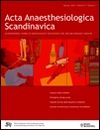
SPINE
Low-dose ketamine reduces morphine consumption after surgery for scoliosis in adolescents
This report has been verified
by one or more authors of the
original publication.
Acta Anaesthesiol Scand. 2015 Nov;59(10):1260-8.
36 adolescent patients undergoing corrective surgery for idiopathic scoliosis were randomly assigned to receive either low-dose ketamine or a placebo intra- and post-operatively. The purpose of this study was to compare postoperative morphine consumption, pain, nausea and vomiting, sedation scores, and antiemetic medication consumption between groups. The results indicated that ketamine significantly reduced morphine and antiemetic consumption at up to 48 hours when compared to placebo. The study groups did not differ in terms of pain, sedation scores, or incidence of nausea and vomiting.
Unlock the full ACE Report
You have access to {0} free articles per month.Click below to unlock and view this {1}
Unlock NowCritical appraisals of the latest, high-impact randomized controlled trials and systematic reviews in orthopaedics
Access to OrthoEvidence podcast content, including collaborations with the Journal of Bone and Joint Surgery, interviews with internationally recognized surgeons, and roundtable discussions on orthopaedic news and topics
Subscription to The Pulse, a twice-weekly evidence-based newsletter designed to help you make better clinical decisions
Exclusive access to original content articles, including in-house systematic reviews, and articles on health research methods and hot orthopaedic topics
Or upgrade today and gain access to all OrthoEvidence content for just $1.99 per week.
Already have an account? Log in


Subscribe to "The Pulse"
Evidence-Based Orthopaedics direct to your inbox.
{0} of {1} free articles
Become an OrthoEvidence Premium Member. Expand your perspective with high-quality evidence.
Upgrade Now













































































